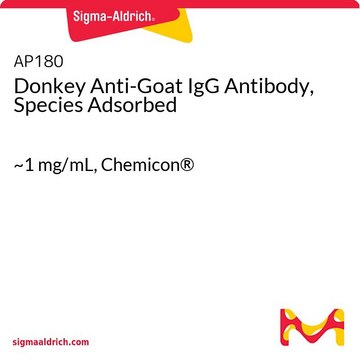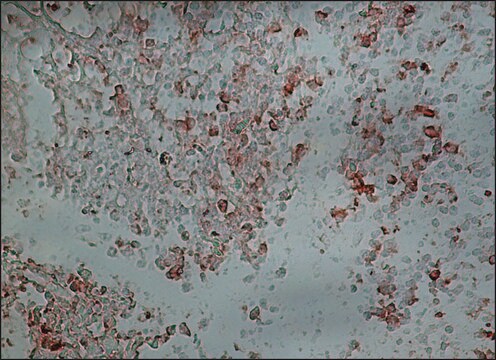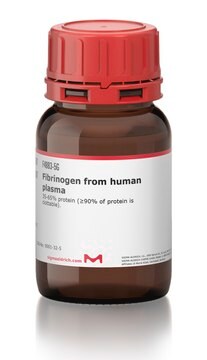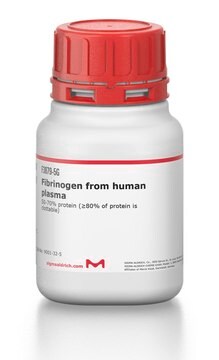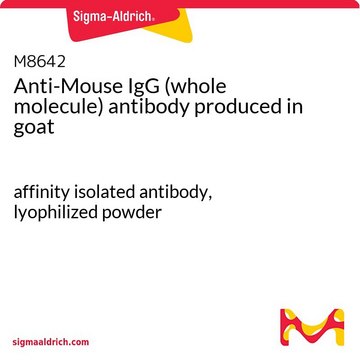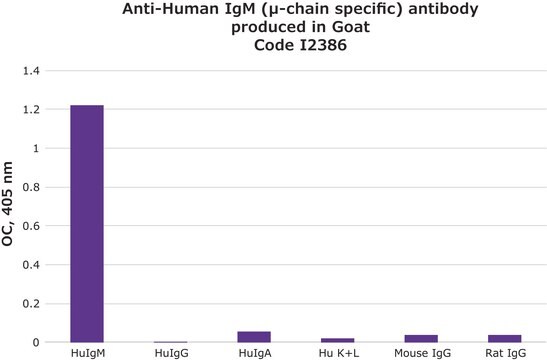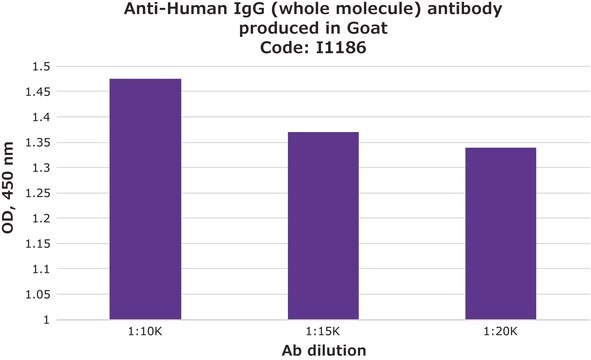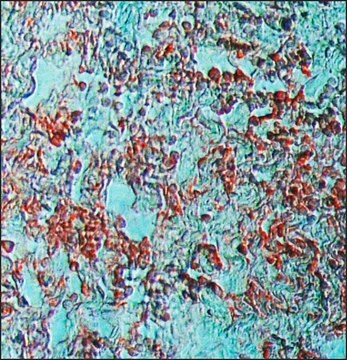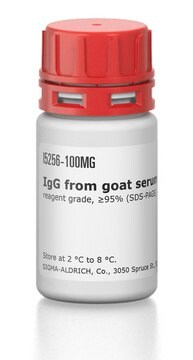G6638
Anti-Goat IgG (whole molecule) antibody produced in donkey
affinity isolated antibody, lyophilized powder
Sign Into View Organizational & Contract Pricing
All Photos(1)
About This Item
Recommended Products
biological source
donkey
Quality Level
conjugate
unconjugated
antibody form
affinity isolated antibody
antibody product type
secondary antibodies
clone
polyclonal
form
lyophilized powder
technique(s)
Ouchterlony double diffusion: suitable
storage temp.
2-8°C
target post-translational modification
unmodified
Looking for similar products? Visit Product Comparison Guide
Application
Anti-Goat IgG (whole molecule) antibody produced in donkey was used for immunohistochemistry of basal ganglia and thalamus sections of long-tailed macaque. The antibody was labeled with 131I tracer to study the diffusion of immunoglobulin G in rat muscle.
Applications in which this antibody has been used successfully, and the associated peer-reviewed papers, are given below.
Immunohistochemistry (1 paper)
Immunohistochemistry (1 paper)
Biochem/physiol Actions
IgG antibody subtype is the most abundant serum immunoglobulin of the immune system. It is secreted by B cells and is found in blood and extracellular fluids and provides protection from infections caused by bacteria, fungi and viruses. Maternal IgG is transferred to fetus through the placenta that is vital for immune defense of the neonate against infections.
Physical form
Lyophilized from 0.01 M sodium phosphate, 0.015 M sodium chloride, pH 7.2
Reconstitution
Reconstitute with 0.135 M sodium chloride.
Disclaimer
Unless otherwise stated in our catalog or other company documentation accompanying the product(s), our products are intended for research use only and are not to be used for any other purpose, which includes but is not limited to, unauthorized commercial uses, in vitro diagnostic uses, ex vivo or in vivo therapeutic uses or any type of consumption or application to humans or animals.
Not finding the right product?
Try our Product Selector Tool.
Storage Class Code
11 - Combustible Solids
WGK
WGK 2
Flash Point(F)
Not applicable
Flash Point(C)
Not applicable
Personal Protective Equipment
dust mask type N95 (US), Eyeshields, Gloves
Choose from one of the most recent versions:
Already Own This Product?
Find documentation for the products that you have recently purchased in the Document Library.
Customers Also Viewed
E R Zakaria et al.
The American journal of physiology, 276(2 Pt 2), H517-H529 (1999-02-10)
Fluid loss from the peritoneal cavity to surrounding tissue varies directly with intraperitoneal hydrostatic pressure (Pip). According to Darcy's law [Q = -KA(dPif/dx)], fluid flux (Q) across a cross-sectional area (A) of tissue will increase with an increase in either
M F Flessner et al.
The American journal of physiology, 273(6 Pt 2), H2783-H2793 (1998-01-22)
Previously, we demonstrated that immunoglobulin G (IgG), dissolved in an isotonic solution in the peritoneal cavity, transported rapidly into the abdominal wall when the intraperitoneal (ip) pressure was > 2 cmH2O. We hypothesized that this was chiefly caused by convection
Sadhana M Gupta et al.
Mediators of inflammation, 2008, 534532-534532 (2009-01-07)
Topical microbicides are intended for frequent use by women in reproductive age. Hence, it is essential to evaluate their impact on mucosal immune function in the vagina. In the present study, we evaluated nisin, a naturally occurring antimicrobial peptide (AMP)
Lu Wei et al.
Nature, 544(7651), 465-470 (2017-04-21)
The ability to visualize directly a large number of distinct molecular species inside cells is increasingly essential for understanding complex systems and processes. Even though existing methods have successfully been used to explore structure-function relationships in nervous systems, to profile
Xuefeng Wang et al.
Applied optics, 47(15), 2779-2789 (2008-05-22)
We perform simultaneous interferometric and fluorescent detection of molecular protein layers on a BioCD. The 488 nm excitation wavelength of fluorescein also provides the interferometric detection channel that operates in a common-path in-line configuration in the condition of phase quadrature
Our team of scientists has experience in all areas of research including Life Science, Material Science, Chemical Synthesis, Chromatography, Analytical and many others.
Contact Technical Service
